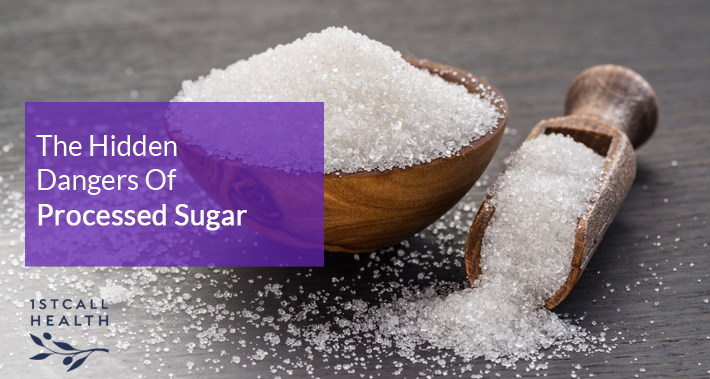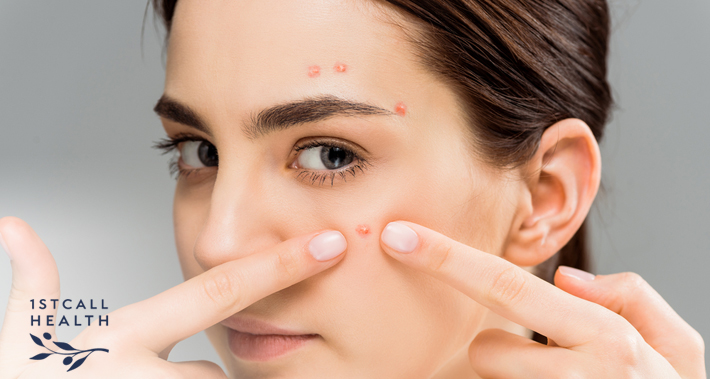
Sugar can be part of a healthy diet – it is, after all, a naturally occurring ingredient in many healthy foods.
The processed sugar added into many food products, however, can drastically increase your intake of other types of sugar.
Excessive sugar intake has been linked to many health concerns and can increase your risk for serious health conditions.
If you have already noticed signs like weight gain, acne, low energy, and depression, it could be linked with too much processed sugar in your diet.
It can even be a cause behind premature aging.
But when it comes to quitting sugar, it’s not always easy.
Here at 1stCallHealth, we’re a nurse practitioner primary care medical clinic and we can help.
Keep reading to find out more about the dangers of processed sugar, and how you can build a healthier diet.
Why Do We Love Sugar?
Sugar can be found in the most unexpected places.
We associate sugar with sweet things – cookies, candy, pastries, and soda, for example.
A little processed sugar once in a while, like a slice of cake on your birthday or a glass of lemonade on a hot afternoon, is alright as an indulgence.
But processed sugar is used to enhance flavor and texture in everything from fruit juice to frozen pizza.
Processed sugar that sneaks into your everyday food can trick your body into feeling hungry and craving more sugar even though your body doesn’t need it.
But why do we love the stuff so much?
There are a few different reasons, including certain nutrient deficiencies and health conditions.
But the main reason is because your body uses sugar as fuel.
As a result, the human body evolved to enjoy sugar – to seek it out.
When you eat sugar, it releases dopamine – a hormone that makes you feel good.
That reinforces your desire for the sweet stuff.
In the natural world, this was helpful because sugar isn’t that common.
But today, sugar is everywhere.
What Does Sugar Do To The Body?
The more processed sugar you eat, the more the effects will start to show.
Sugar in your system can affect everything from how your body stores fat to how your organs function.
Let’s take a closer look at how excess sugar can affect your health.
1. It’s Linked With Obesity
A 2022 review by Malik and Hu looked at a variety of different studies showing links between weight gain and sugar sweetened beverages.
Juice, coffee drinks, soda and smoothies are often sweetened with fructose, which may interfere with how your body regulates hunger.
Sugar sweetened beverages add to your overall intake of calories, but they don’t do much to satisfy your hunger.
This makes it easy to consume more calories than your body needs without really feeling it.
In addition, sugar sweetened beverages are associated with an increase in deep belly fat, a type of fat linked to greater risk of both diabetes and heart disease.
Speaking of which…
2. It’s Linked With Heart Disease
High levels of processed sugar in your diet may increase your chances of having a stroke or heart attack.
Research shows that the source of added sugar in your diet might also matter.
In a study published in 2020, researchers looked at the diet habits and health outcomes of over 25,000 people in Sweden.
This study found that having eight or more servings of sweetened drinks each week was linked to a higher risk of stroke.
Treats like pastries or ice cream and toppings like jam or honey, on the other hand, had a lower risk.
That said, it’s a good idea to control your intake of processed sugar overall.
3. It’s Linked With Type 2 Diabetes
Large quantities of added sugar in your diet is linked to weight gain and higher levels of body fat.
Both weight gain and increased body fat are risk factors for type 2 diabetes.
One possible explanation for the relationship between sugar and diabetes is that high levels of sugar cause your pancreas to produce more insulin.
Having high levels of insulin in your body over a long time can make your body less sensitive to this sugar regulating hormone.
4. It’s Linked With Poor Mental Health
High intake of processed sugars can contribute to problems with brain function, memory, and even anxiety and depression.
One study showed that men who had 67 grams or more of daily added sugar in their food and drink were 23% more likely to develop depression than men who ate less than 40 grams of sugar each day.
Researchers have suggested that chronic inflammation, insulin resistance, and impacts on how your body processes dopamine could all be effects of processed sugar that contribute to mental health conditions.
RELATED: Adaptogenic Herbs To Help Soothe Your Anxiety Naturally
5. It’s Bad For Your Skin
Eating high amounts of sugar can increase everyday acne breakouts and can make your skin age faster.
You may have heard different ideas about foods that contribute to acne – chocolate, cheese, dairy in general.
Not all these ideas are true, but it turns out that research does point to a relationship between sugar and acne breakouts.
When you ingest high levels of sugar or simple carbohydrates, your insulin levels spike.
Increases in insulin levels encourage your body to release androgens and produce an oily substance called sebum, both of which contribute to acne.
Sugar can also interact with protein in your body to produce advanced glycation end products, or AGEs.
AGEs damage collagen and elastin proteins in your body, both of which are known to encourage elasticity in your skin.
Without healthy elastin and collagen, your skin will lose its firmness and begin to form wrinkles.
So, yes, AGEs can cause premature aging, making it the most appropriate medical acronym since SAD (seasonal affective disorder).

6. Other Risks Of Too Much Sugar
A diet with high levels of processed sugar can impact your health in many other ways, including:
- Increased risk of cancer
- Faster cellular aging
- Low energy
- Fatty liver
- Increased risk of kidney disease
- Tooth demineralization leading to cavities
- Increased risk of gout
- Faster cognitive decline, including increased risk of dementia and Alzheimer’s disease
Can You Live Without Sugar?
While your body needs sugar to perform many of its regular functions, you can definitely live with less processed sugar in your diet.
Your body can generally produce enough of the sugar it needs – glucose – by breaking down the protein, fat, and carbohydrates you get from a balanced diet.
You can get other sugars in your diet from naturally sweet whole foods like fruits and vegetables.
While these sugars are different from glucose, they come along with nutrients and fiber that your body needs, so they aren’t cause for concern.
Some people turn to artificial sweeteners so they can keep enjoying sodas and coffee.
While there is no clear evidence that artificial sweeteners increase cancer risks, a worry that has been around for years, it’s also not clear if they are a good alternative to added sugar.
Studies suggest that artificial sweeteners may disrupt digestion and encourage overeating.
Luckily, there are other ways to cut down on added sugars without losing out on sweetness.
What’s The Healthiest Way To Reduce Sugar Intake?
There are many simple ways to cut down on added sugars in your diet.
First, make sure you know what to watch out for.
Sucrose, glucose, fructose, hydrolysed starch, corn syrup, honey, agave, molasses, fruit juice, and invert sugar are all code words for added sugar.
Foods that are low in sugar generally contain 5 grams or less of total sugar in a 100g serving.
And watch out for “low in fat” foods as well – many of these foods use sugars and other additives to enhance flavour.
The easiest way to swap out processed sugar is to opt for naturally sweet whole foods instead.
For example, try replacing syrups and jams on pancakes or in yogurt with fresh or frozen berries.
Use cinnamon, vanilla, ginger or nutmeg to add natural sweetness and flavour.
Swap sugar for sweeteners like applesauce or maple syrup in baking.
Switch out half of your all purpose flour for whole wheat flour to increase the amount of fiber in your diet.
Make your own dressings and sauces at home and try easy at home toppings like grilled onions and tomato slices instead of condiments.
But the easiest way to decrease your processed sugar intake?
Swap out juice, soda, and sports drinks for a sugar free classic: water.
Book Your Appointment With 1stCallHealth Today
If you’re already experiencing the health effects of high levels of added sugar in your diet, you might benefit from some direct support.
If you need help figuring out how to change your diet, we’ve got that covered too!
Book your appointment with 1stCallHealth today to find out how sweet life with less processed sugar can be.
1stCallHEALTH
1331 H St NW Ste 200,
Washington, DC 20005
(202) 590-0009
– https://goo.gl/maps/MVhjkz2jqynWpsgo6
1stCallHEALTH provides affordable access to primary care services. We believe that everyone deserves affordable, high quality primary care. Our vision is to challenge the status quo, focus on the individual, and empower personal control to change the way we think about healthcare.




